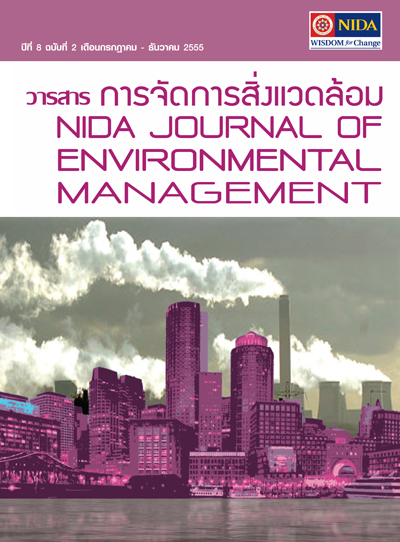ความท้าทายและอุปสรรคในการประยุกต์ใช้มาตรการกำหนดค่าตอบแทน เพื่อบริการด้านสิ่งแวดล้อม: กรณีเกษตรเพื่อการอนุรักษ์ในเขตพื้นที่ลุ่มน้ำแม่สา จังหวัดเชียงใหม่
บทคัดย่อ
บทคัดย่อ
การเพิ่มขึ้นของประชากรและการขยายตัวของอุตสาหกรรม ธุรกิจท่องเที่ยว ตลอดจนการทำการเกษตรอย่างเข้มข้นในพื้นที่ลุ่มน้ำ ทำให้เกิดการขาดแคลนน้ำ ปัญหาคุณภาพ และความขัดแย้งในการใช้ทรัพยากรน้ำ ซึ่งส่งผลต่อเนื่องถึงสวัสดิการของสังคมส่วนรวม ปัญหาดังกล่าวสะท้อนให้เห็นความจำเป็นในการทบทวนแนวทางในการจัดการทรัพยากรน้ำอย่างยั่งยืน การกำหนดค่าตอบแทนเพื่อบริการด้านสิ่งแวดล้อม (Payment for environmental services: PES) นับเป็นทางเลือกหนึ่งในการบริหารจัดการโดยการมีส่วนร่วมของผู้มีส่วนเกี่ยวข้องในระดับพื้นที่ ผลการศึกษาการประยุกต์ใช้แนวคิด PES ในพื้นที่ลุ่มน้ำแม่สา จังหวัดเชียงใหม่ พบว่ามีโอกาสในการสร้างแรงจูงใจให้เกิดการปรับเปลี่ยนพฤติกรรมของเกษตรกรในพื้นที่ต้นน้ำจากการทำเกษตรอย่างเข้มข้น เป็นการทำการเกษตรที่ควบคู่ไปกับการอนุรักษ์สิ่งแวดล้อม ซึ่งจะทำให้เกิดผลดีทั้งในด้านปริมาณและคุณภาพของทรัพยากรน้ำต่อผู้ใช้กลุ่มอื่นๆ การเปลี่ยนแปลงนี้จะเกิดขึ้นได้ ถ้าได้รับการสนับสนุนที่ดีจากกลุ่มธุรกิจ ชุมชน รวมทั้งคนในสังคมที่ได้รับผลประโยชน์ อย่างไรก็ตาม ความสำเร็จในการนำมาตรการดังกล่าวไปใช้ต้องอาศัยเวลา เนื่องจากมาตรการ PES เป็นแนวทางการจัดการที่ค่อนข้างใหม่ในสังคมไทย จำเป็นต้องมีการกำหนดกฎ ระเบียบ และสิทธิในการใช้ประโยชน์จากทรัพยากรในระดับประเทศที่ชัดเจนเพื่อเอื้อต่อการพัฒนาระบบบริหารจัดการ รวมทั้งการปรับเปลี่ยนทัศนคติของคนในสังคมให้ตระหนักถึงการมีหน้าที่ร่วมกันอนุรักษ์ทรัพยากรธรรมชาติและสิ่งแวดล้อม เพื่อเป็นทุนในการพัฒนาสังคมไทยอย่างยั่งยืนต่อไป
คำสำคัญ:ค่าตอบแทนเพื่อบริการด้านสิ่งแวดล้อม; เกษตรเพื่อการอนุรักษ์; พื้นที่ลุ่มน้ำแม่สา
Abstract
Degradation of natural resources in the watershed areas of Thailand has been associated with rapid economic development, continuous population growth, an expansion of the tourism sector, and an intensification of agriculture. Water shortages and conflicting use of natural resources among various actors have shown a negative impact on the welfare of local people in the watersheds and people in the whole society. Developing sustainable water resource management measures in the watershed areas of Thailand is thus urgently required. Payment for Environmental Services (PES) is considered a promising option for sustainable water resource management under the participation of all local stakeholders. Drawing on a case study of Mae Sa watershed, Chiang Mai province, our results suggest that there is an opportunity to motivate upland farmers to switch from intensive to conservative agriculture under generous support from those communities and other stakeholders that would benefit from improved water resources. As PES is a rather new concept for the Thai society, in order to successfully establish and implement such a scheme would take times and would requires a significant change in the policy approach. This includes a supportive legal and regulatory framework with clear defined property rights regarding natural resource uses which would facilitate the development of a PES management system. Changing attitudes and raising the awareness that conserving natural resource is the duty of all citizens could be considered a crucial factor for successful PES establishment. This would make an important contribution to the sustainable development of the country.
Keywords: Payment for Environmental Services: PES; Conservative Agriculture; Mae Sa Watershed



